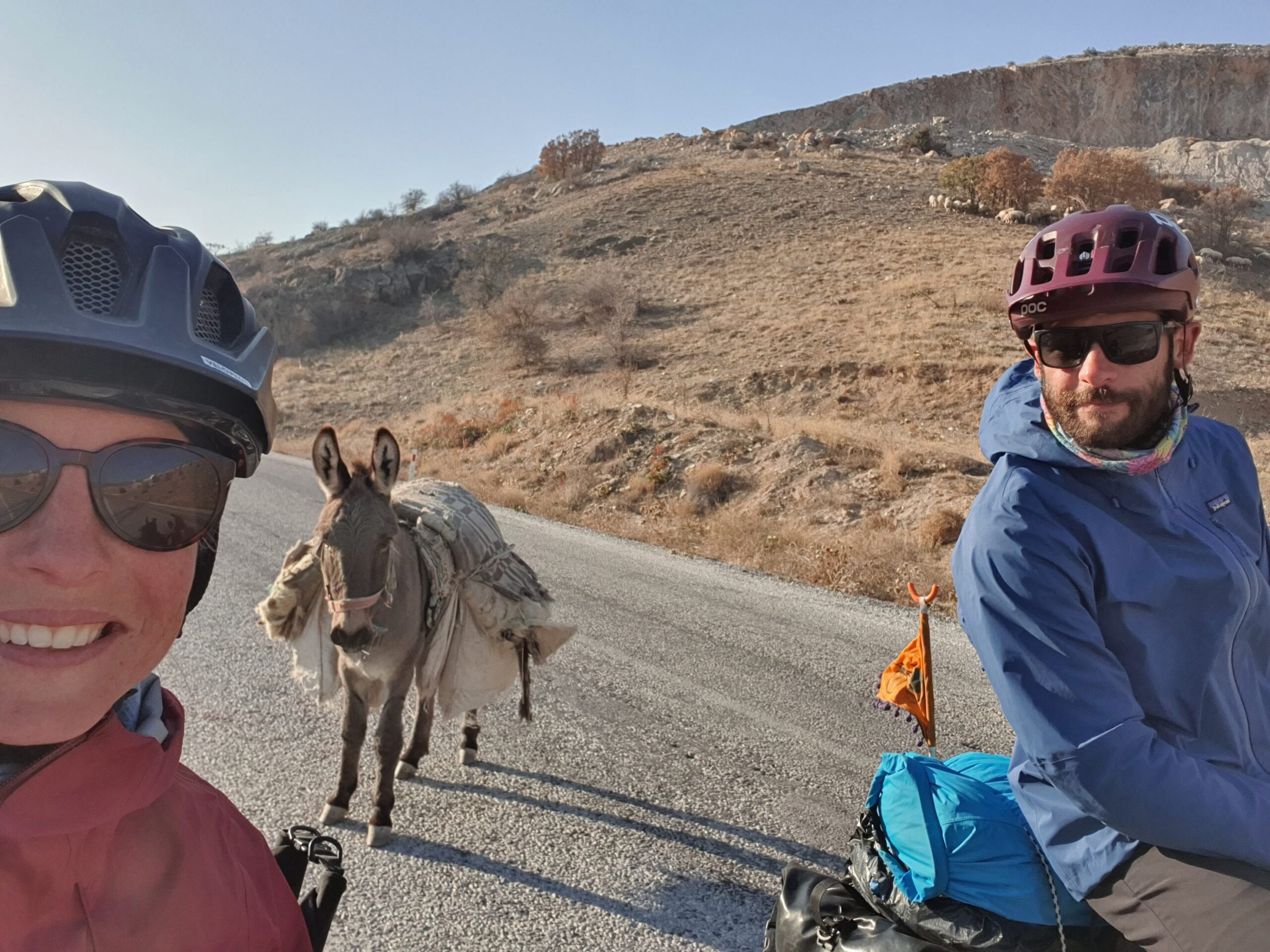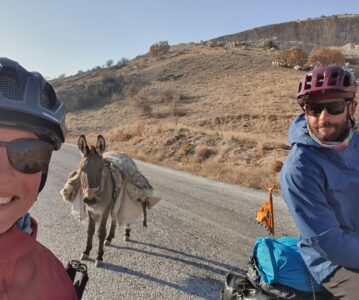We say goodbye to Fatma Nur and Bilgen and drive to the moon for the time being. We tramp through a white shimmering hilly landscape and wonder if we are the last remaining humans on the planet.
Marble is mined in this area. The hills and the ground are bare, only bristly grass is able to grow here. The road is the only sign of human omnipresence and disappears in the distance in the haze of the vastness. At some point, shepherds and their flocks can be seen more often again and we find our place to spend the night in a small village, which hides from the wind in a large depression. Some teenagers have lit a fire near the mosque and call an English speaking uncle at the sight of us. “What do you want in my village?” the elegant gentleman soon asks us, not really wanting to fit into this scene. It soon turns out: We are welcome. For the first tourists here, the key for the unused tea room is found. While Louie cooks our dinner on our gasoline stove, I talk with the boys at the fire about life and their wishes. They all don’t want to stay here in the village, but live in the city. No, no, they would never miss the village in the city, they say in response to my objection. Do they know how to cook, I ask them, pointing to Louie. The answer is mixed. Inez, the bravest of the group, shakes his head decisively. “If it weren’t for your wives, you’d starve,” I type into my phone. Inez taps back, “Our women are very valuable!” On my question still the usual leisure activity the answer is however very fast and unanimous: “Phone!”. At some point Inez and his friends say goodbye in the direction of home. Of course not without giving us a handful of freshly picked apples.
We set up camp on the floor of the tea room and are awakened in the middle of the night by the sound of a storm. We rescue our bicycles into the tea room, watch as a street lamp goes up in sparks and can’t believe our luck at being invited by the guys into this storm-proof room.
The next day, the sky is steel blue again and the air is bone-chillingly cold. What a drop in temperature! It’s early November and winter seems to be catching up with us after all.
A few kilometers after the village we stumble into the hustle and bustle of a colorful and noisy weekly market. We let ourselves drift between the stalls, admire the rich displays, are amused by the fish sellers who advertise their goods unnecessarily loudly, buy fresh mandarins for 20 centimes a kilo, blue cheese, snacks, new spice mixtures for our stews, simet (sesame curls) for the “Gluscht”, garlic and other little things and are only allowed to pay for about half of them. The merchants stick their chins up and make a snapping sound. We often encounter this gesture, which takes some getting used to, and therefore know to interpret it as a ‘no’.
Also today we are looking for a wind protection for our tent and since far and wide no tree grows, we look for a suitable place in the small village Saçikara. Since we also have to fill up with water, the mosque is always our starting point for such a search. It does not take long and the local imam reads through our magic letter. After a short phone call with the village patron, Ismael (Imam) beckons us into the currently empty Koran school. What luck! Carpeted floors, a washbasin and even a toilet promise unexpected comfort. But the imam, who lives with his family in the apartment above the school, doesn’t mess around and a few minutes after the evening prayer he enters the room with steaming plates. The food is exquisite and the young-looking Ishmael points to his rather ample midsection and says “I’m the best proof of my wife’s cooking skills!”
The small stove in the classroom is fired up in spite of our rejoinders, mattress pillows are brought in and soon we can take off our jackets, give up any self-cooking intentions and are happy about the cozy warmth.
What is wonderful about the Turkish hospitality is that it is very attentive on the one hand – the obligatory tea jug is immediately placed on the glowing stove, and the fresh toilet paper in front of the toilet – but the hosts also leave us alone and give us some time and space for ourselves. It is certainly an advantage here to be a married couple. This concept is understandable and natural for them and is accepted accordingly without any problems.
Also the next morning we can’t convince Ismael that we can take care of ourselves without any problems. As I say goodbye, thanking him again for the hospitality and the food, he types into his phone, “The more comfortable you are, the more comfortable we are!” He, too, expresses the wish that we help put Islam and its followers in a more positive light in our Western world than the media does.
This another sunny but cold day of driving takes us again high into the mountains and into our coldest camp yet. The water bottles in the tent inside freeze and in the morning we first have to free the tent from a thin layer of ice to let it dry in the morning sun. Since we have set up our night camp on the ascent over another pass, the climb soon heats us up again and the -5°C of the night are quickly forgotten. On the height imposing wind turbines rise into the sky. We decide to leave the bikes at the top of the pass and climb a bit further on foot. This walk brings us a funny encounter with a wild looking shepherd and his 500 sheep and after a picnic in the sun with a magnificent view an invitation for tea in the sub-station of the wind turbine. The young engineers seem to be happy about the change and drive us back to our bicycles in an off-road vehicle on the most adventurous road. The barren, hilly landscape stays with us until we reach the big city of Konya. We can hardly believe our eyes as the sterile housing estates begin to appear in the dusk. The city pours into the vast plain of Konya and offers modern comfort for about 1.5 million people. The outer quarters and street arteries are very generously laid out; bicycle paths, many green spaces and even a tramway are part of the program. Konya is considered the most conservative city in Turkey, which is reflected in the corresponding election results, the density of mosques and the female wardrobe. Nevertheless, Konya is also a student city and these populate the interesting city center. However, we search in vain for bars: Our hosts tell us later that the parties here take place mainly in private apartments. After six years in Konya, they know just three bars. We were attracted to Konya by several things. At the top of the list is the Mevlana Museum in Konya. The great Persian poet Rumi worked in this city about 700 years ago. He lived mystical Islam and co-founded the Sufi brotherhood Mevlevi. This order has become famous especially for the “Whirling Derwishes”. In a pompous cultural center built especially for this purpose, we actually get to enjoy this special ritual.
The planned two nights in Konya turn into three, as we both suffered a bit from the harsh temperatures and the twelve days of driving took their toll on us. The two Colombians Jonatan and Arling share their comfortable home with us, spoil us with delicious food, sore throat tablets, hot chocolate with cheese in it and their uncomplicatedness. The two have been living, studying and working in this surprisingly friendly big city for several years and are now planning their return trip back to tropical Bogota. We are very grateful to them and enjoy the South American vibe in their home.
Translated with www.DeepL.com/Translator (free version)


